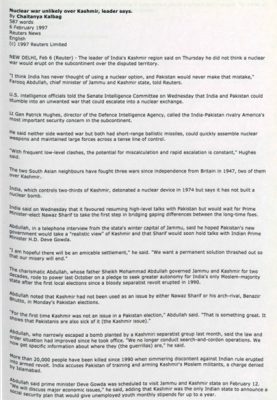Nuclear war unlikely over Kashmir, leader says
[Reuters]
Published date: 6th Feb 1997
6 February 1997
Reuters News
English
(c) 1997 Reuters Limited
NEW DELHI, Feb 6 (Reuter) – The leader of India’s Kashmir region said on Thursday he did not think a nuclear war would erupt on the subcontinent over the disputed territory.
“I think India has never thought of using a nuclear option, and Pakistan would never make that mistake,” Farooq Abdullah, chief minister of Jammu and Kashmir state, told Reuters.
U.S. intelligence officials told the Senate Intelligence Committee on Wednesday that India and Pakistan could stumble into an unwanted war that could escalate into a nuclear exchange.
Lt Gen Patrick Hughes, director of the Defence Intelligence Agency, called the India-Pakistan rivalry America’s most important security concern in the subcontinent.
He said neither side wanted war but both had short-range ballistic missiles, could quickly assemble nuclear weapons and maintained large forces across a tense line of control.
“With frequent low-level clashes, the potential for miscalculation and rapid escalation is constant,” Hughes said.
The two South Asian neighbours have fought three wars since independence from Britain in 1947, two of them over Kashmir.
India, which controls two-thirds of Kashmir, detonated a nuclear device in 1974 but says it has not built a nuclear bomb.
India said on Wednesday that it favoured resuming high-level talks with Pakistan but would wait for Prime Minister-elect Nawaz Sharif to take the first step in bridging gaping differences between the long-time foes.
Abdullah, in a telephone interview from the state’s winter capital of Jammu, said he hoped Pakistan’s new government would take a “realistic view” of Kashmir and that Sharif would soon hold talks with Indian Prime Minister H.D. Deve Gowda.
“I am hopeful there will be an amicable settlement,” he said. “We want a permanent solution thrashed out so that our misery will end.”
The charismatic Abdullah, whose father Sheikh Mohammad Abdullah governed Jammu and Kashmir for two decades, rode to power last October on a pledge to seek greater autonomy for India’s only Moslem-majority state after the first local elections since a bloody separatist revolt erupted in 1990.
Abdullah noted that Kashmir had not been used as an issue by either Nawaz Sharif or his arch-rival, Benazir Bhutto, in Monday’s Pakistan elections.“For the first time Kashmir was not an issue in a Pakistan election,” Abdullah said. “That is something great. It shows that Pakistanis are also sick of it (the Kashmir issue).”
Abdullah, who narrowly escaped a bomb planted by a Kashmiri separatist group last month, said the law and order situation had improved since he took office. “We no longer conduct search-and-cordon operations. We now get specific information about where they (the guerrillas) are,” he said.
More than 20,000 people have been killed since 1990 when simmering discontent against Indian rule erupted into armed revolt. India accuses Pakistan of training and arming Kashmir’s Moslem militants, a charge denied by Islamabad.
Abdullah said prime minister Deve Gowda was scheduled to visit Jammu and Kashmir state on February 12. We will discuss major economic issues,” he said, adding that Kashmir was the only Indian state to announce a social security plan that would give unemployed youth monthly stipends for up to a year.
“That will give our educated youth time to find either a government job or a private job,” he said. “Or three or four of them could get together and start a shop or a business.”
(c) Reuters Limited 1997






